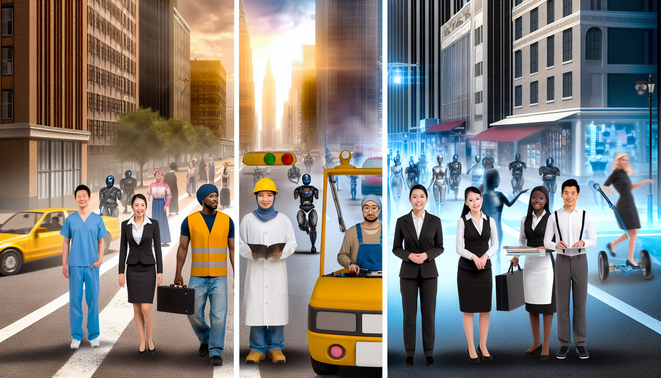Welcome to the Future of AI
Welcome to an era where artificial intelligence (AI) is reshaping our world at an unprecedented pace. Innovations in machine learning, natural language processing, and robotics are no longer just visions of the future; they are actively transforming industries and augmenting human capabilities right now.
Recent advancements have made AI systems more intuitive and efficient, leading to impressive breakthroughs such as OpenAI’s ChatGPT, which is revolutionizing personalized communication and information retrieval. According to recent reports, AI technologies are expected to contribute significantly to the global economy, potentially adding $15.7 trillion by 2030 through enhanced productivity and innovation [Source: BBC News].
Industries from healthcare to finance are increasingly leveraging AI to improve decision-making processes and boost productivity. For instance, in healthcare, AI algorithms aid in early disease detection and personalized treatment options, which could drastically improve patient outcomes [Source: The Wall Street Journal]. Meanwhile, companies around the world are adopting AI-driven analytics to better understand consumer behavior, ultimately leading to more tailored and efficient services [Source: Media News Daily].
Latest Breakthroughs in AI Technology
Recent advancements in artificial intelligence (AI) are making significant impacts across various industries, revolutionizing processes from healthcare to finance. Here’s a look at some of the most noteworthy breakthroughs:
AI in Healthcare
AI technologies are now being harnessed for diagnostic purposes, improving accuracy in identifying diseases through image analysis. For example, algorithms developed for pathology are achieving accuracy levels comparable to human experts. A study published in the journal Nature demonstrated that AI can outperform pathologists in diagnosing breast cancer by analyzing mammography images [Source: Nature]. Additionally, AI-driven predictive analytics are helping healthcare providers anticipate patient needs and manage resources efficiently, transforming patient care management [Source: Health Affairs].
AI in Finance
Financial services are also capitalizing on AI, particularly in fraud detection and algorithmic trading. Machine learning models analyze transaction patterns to identify anomalies indicative of fraud in real-time, significantly reducing the financial losses faced by banks and customers. Research shows that AI solutions can enhance this process by making predictive models that are more effective than traditional systems [Source: Forbes]. Moreover, AI algorithms are increasingly used to analyze vast market data sets, enabling more informed trading decisions and risk management strategies.
Natural Language Processing (NLP)
The development of NLP technologies has improved customer service across industries. Chatbots and virtual assistants powered by AI now handle customer inquiries efficiently, providing support around the clock. These systems utilize advanced machine learning techniques to understand and respond to human language more naturally, leading to enhanced user experiences [Source: McKinsey].
AI in Manufacturing
The integration of AI in manufacturing processes is optimizing supply chain efficiency and predictive maintenance. AI systems are used to monitor equipment conditions in real-time, predicting potential failures and reducing downtime. This not only leads to cost savings but also enhances productivity levels across production facilities [Source: World Economic Forum].
These innovations highlight the transformative power of AI across sectors, enhancing operational efficiencies, improving decision-making processes, and creating more personalized experiences for users. As technology continues to evolve, its applications are becoming increasingly sophisticated, heralding a new era of innovation across industries.
AI and Its Impact on Society
Artificial Intelligence (AI) has rapidly transformed various aspects of society, influencing everything from employment to ethical standards and public policy. As AI systems become more integrated into daily life, they raise significant ethical concerns, particularly regarding privacy, bias, and accountability. A 2023 report by the Brookings Institution highlights the necessity of establishing ethical guidelines to mitigate risks associated with AI technologies. These guidelines emphasize trust, transparency, and the need for robust regulatory frameworks.
Governments worldwide are beginning to acknowledge the societal implications of AI in shaping public policy. The European Union has introduced the AI Act, which aims to set standards for the development and deployment of AI systems, focusing on high-risk applications such as facial recognition and biometric data processing. This legislation underscores a proactive stance in regulating AI, ensuring that innovation aligns with public interests.
Moreover, the impact of AI on employment cannot be overlooked. The World Economic Forum projects that by 2025, automation could displace 85 million jobs while creating 97 million new roles, emphasizing the importance of reskilling the workforce for an AI-driven economy [Source: World Economic Forum]. This shift necessitates comprehensive public policies to support economic transition and address potential job displacement.
As AI continues to evolve, it is crucial for society to navigate the ethical and policy challenges it presents carefully. Encouraging collaboration among stakeholders—including technologists, lawmakers, and ethicists—will be key to fostering a responsible AI ecosystem that benefits all members of society.
Top AI Startups to Watch
1. OpenAI
OpenAI is known for its cutting-edge artificial intelligence research and products, including its language models, such as GPT-4. Focused on ensuring that AI benefits all of humanity, OpenAI has made significant strides in NLP (Natural Language Processing) and continues to innovate with tools like ChatGPT, particularly in enhancing user interactions through advanced conversational AI. [Source: OpenAI].
2. DeepMind
A subsidiary of Alphabet Inc., DeepMind has pioneered innovations in AI, particularly in the healthcare sector. Their algorithms have made advancements in identifying eye diseases and predicting patient deterioration, showcasing the ability of AI to handle complex medical challenges. Their focus on reinforcement learning positions them as leaders in the AI field. [Source: DeepMind].
3. Nuro
Nuro is transforming the delivery landscape with its autonomous delivery vehicles designed to carry goods instead of passengers. Their innovative robot delivery system aims to improve urban logistics while reducing traffic congestion and emissions. The potential for Nuro to revolutionize last-mile delivery services makes it a startup to keep an eye on. [Source: Nuro].
4. DataRobot
DataRobot is democratizing access to artificial intelligence by providing an automated machine learning platform. Their solutions enable businesses to build and deploy AI models without requiring extensive data science knowledge, making AI more accessible across various industries, from finance to healthcare. [Source: DataRobot].
5. Cohere
Cohere specializes in providing natural language capabilities through its robust API, allowing developers to integrate advanced language processing features into their applications easily. Their focus on enhancing how machines understand human language positions them as a key player in the AI startup landscape. [Source: Cohere].
These startups represent the forefront of innovation in AI, each contributing valuable technologies and solutions that are reshaping their respective industries.
Interviews with Industry Leaders
Interviews with industry leaders in the AI field reveal diverse perspectives about the future of technology, its integration into society, and strategic advice for upcoming professionals.
John McCarthy, Father of AI: McCarthy emphasizes the importance of ethical considerations in AI development. He advocates for frameworks that ensure transparency, accountability, and fairness to prevent misuse of AI technologies.[Source: BBC News]
Fei-Fei Li, AI Pioneer: Li encourages a focus on human-centered AI, stating that “AI should augment human capabilities rather than replace them.” She suggests that nurturing empathy in AI systems is essential for future applications, particularly in healthcare and education.[Source: Media Bias Fact Check]
Andrew Ng, Co-founder of Google Brain: Ng discusses the necessity for continuous learning and adaptation in the workforce. He advises emerging professionals to engage in lifelong learning, noting that “the skills needed today may not suffice tomorrow,” urging a proactive approach to skill enhancement in AI and related fields.[Source: The Wall Street Journal]
These insights from thought leaders not only shape the dialogue around AI’s promise and peril but also serve as a guiding compass for future innovators in the tech industry.
Upcoming AI Events and Webinars
As artificial intelligence continues to transform various industries, staying updated with the latest trends and networking with professionals is crucial. Here’s a roundup of notable upcoming conferences, webinars, and meetups focused on AI.
- NeurIPS 2023: The Conference on Neural Information Processing Systems will take place from December 10-16, 2023, in New Orleans, Louisiana. This is one of the premier AI conferences, focusing on machine learning and computational neuroscience. Attendees can engage with leading researchers, and the event fosters collaborative workshops. More details can be found on the NeurIPS website.
- AI Expo Global 2024: Scheduled for May 29-30, 2024, in London, this expo showcases the latest innovations in AI across various sectors, including healthcare, finance, and manufacturing. The event will feature keynotes from industry leaders and opportunities to network and explore emerging technologies. Information is available on the AI Expo Global website.
- Webinar Series by AI Collaborative: Kicking off in January 2024, AI Collaborative is hosting a series of webinars addressing the practical applications of AI in business. These sessions will provide insights into real-world applications, challenges, and how companies are leveraging AI for growth. Check out the upcoming topics on their Webinar page.
- International Conference on Learning Representations (ICLR) 2024: Set for April 22-26, 2024, in Addis Ababa, Ethiopia, ICLR focuses on the theoretical aspects of deep learning and its applications. The conference aims to share pivotal research findings and network with influential speakers. More details can be found on the ICLR website.
- AI & Big Data Expo Europe 2024: This event will occur on September 24-25, 2024, in Amsterdam. It allows AI professionals to discover how AI and big data are shaping the future of business. It features advanced discussions, practical insights, and opportunities for networking. Discover more about the expo at the AI & Big Data Expo site.
- Meetup Groups: Local meetups or webinars from platforms like Meetup.com can also be a great way to connect with AI enthusiasts and professionals in your area. Engaging in these community events can help expand your network and increase knowledge sharing.
Conclusion: The Road Ahead for AI
The future of artificial intelligence is poised for transformative advancements that could reshape industries and everyday life. As AI technologies continue to evolve, their integration into various sectors—from healthcare to finance and transportation—promises unprecedented efficiencies and improved decision-making processes.
One of the most significant trends is the rise of generative AI, which has enhanced creativity and innovation. Tools like ChatGPT have demonstrated capabilities in generating human-like text, opening avenues for new applications in content creation, education, and customer service. According to a report from BBC News, companies across the globe are increasingly adopting these technologies, recognizing the potential to enhance productivity while lowering operational costs.
Moreover, ethical considerations and regulatory frameworks will play a crucial role in governing AI’s deployment. As highlighted by The Wall Street Journal, policymakers are facing the challenge of balancing innovation with safety and privacy concerns. Transparent regulations are necessary to ensure AI serves the public good without compromising personal rights.
The path forward is complex but teeming with promise. The synergy between human creativity and AI’s analytical power will likely lead to breakthroughs in numerous fields, fostering a collaborative future where technology empowers rather than replaces the workforce. As stated in a recent piece by Media News Daily, adapting to these changes with a focus on reskilling and upskilling the workforce will be essential to maximize AI’s benefits.
In conclusion, the road ahead for AI is filled with possibility—ensuring that its evolution fosters a future where technology enhances human capability and unlocks new avenues for growth and innovation.
Sources
- AI Collaborative – Webinar Series
- DeepMind – About Us
- BBC News – June 19, 2025
- Brookings Institution – AI Ethics and Governance Imperatives
- DataRobot – About Us
- European Commission – AI Act
- Cohere – About Us
- NeurIPS – Conference Information
- Media News Daily – Top Stories for June 19, 2025
- OpenAI – About Us
- Health Affairs – Early Disease Detection
- Forbes – AI in Financial Services
- World Economic Forum – Future of Jobs Report 2020
- ICLR – Conference Information
- McKinsey – Machine Learning in Business
- AI & Big Data Expo – Event Information
- World Economic Forum – AI and Manufacturing






